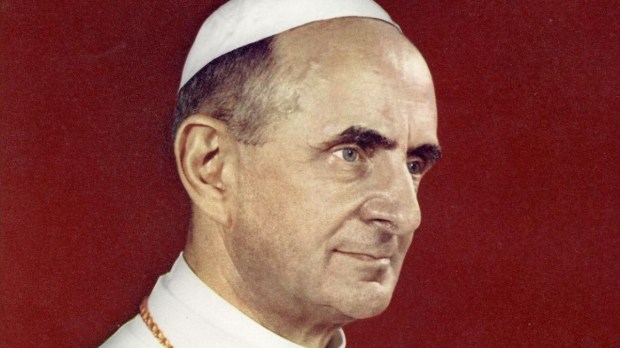On the 60th anniversary of the election of the Archbishop of Milan, Giovanni Battista Cardinal Montini, to the papacy, it is appropriate to take a moment to stop and reflect. The pontificate of Paul VI had an impact on the Church that is felt to this day, but I would like to focus on the holiness of St. Paul VI and, in particular, three aspects of his spirituality and life that I find particularly moving and that we can each benefit from.
Hearer of the cry of the poor
Per longstanding tradition, when Paul VI was made Pope, he was crowned with a three-tiered golden tiara. Over the course of the next year and a half, the question of world poverty came up repeatedly at the Second Vatican Council, with many Fathers of the Council urging the Church to forgo all shows of pomp and to embrace poverty with more vigor. Moved by these pleas, Paul VI made a dramatic gesture, as described in a New York Times article at the time:
“At the close of a solemn liturgical Mass in the Byzantine-Slavic Rite, the Pope rose from his throne, descended a few steps and placed the gleaming tiara on the altar.”
Though Paul VI had no personal love for ornate displays, that tiara had been a gift of the Catholics of his old diocese, Milan. For this reason, it no doubt had sentimental value to him. Nevertheless, it was announced that Pope Paul VI would donate the tiara to benefit the poor of the world. That would also be the last time a crown was worn by a pope.
Donations from Catholics in the United States brought Paul VI’s tiara to Washington, DC. It can now be viewed at the Basilica of the Shrine of the Immaculate Conception. It makes an impressive display. I wonder, however, how many see that golden tiara and understand the lesson it is intended to convey – that, per the Lord’s command, what has been given to us is meant to be shared with the poor. Like Paul VI, we are called to hear their cry and personally sacrifice to provide for them.
Friend of the unborn
It should come as no surprise that the author of Humanae Vitae remains a staunch friend of the most vulnerable – the unborn. Both of the miracles that led to St. Paul VI’s canonization involved unborn babies whose mothers were advised to seek abortions.
One baby was gravely ill and at risk of brain damage, the other appeared to be disabled. Doctors had insisted there was no hope for either child, but in both cases, their mothers had prayed for Paul VI’s intercession. When both babies were born healthy, doctors had no explanations.
It is easy to forget or ignore the unborn as they are always out of our sight. That St. Paul VI seems to have a special preference for them should serve as a wakeup call. When we ignore the most vulnerable member of the human family, we ignore God. May they be as precious to us as they are to the “saint of the unborn.”
Prophet of peace
On October 4, 1965, Paul VI became the first pope to address the United Nations on the occasion of its 20th anniversary. His speech, delivered at the height of the Cold War, was a plea that all nations turn away from war and instead engage in dialogue and seek peaceful coexistence.
In his speech, Paul VI said that he was speaking “for the dead as well as the living: for the dead who have fallen in the terrible wars of the past, dreaming of world peace and harmony; for the living who have survived the wars and who in their hearts condemn in advance those who would try to have them repeated …”
Referring to the example of Christ, he said:
“It is impossible for someone to be a brother if he is not humble. For it is pride, as inevitable as it may seem, that provokes the tensions and struggles over prestige, over domination, over colonialism, over selfishness. It is pride that shatters brotherhood.
“Here our message reaches its culmination and we will speak first of all negatively. These are the words you are looking for us to say and the words we cannot utter without feeling aware of their seriousness and solemnity: never again one against the other, never, never again!”
It is in this part of his speech that we see that Paul VI’s message was not intended exclusively for the delegates in the General Assembly, but was directed to all people, including all of us. In a world rife with arrogance, conflict, and hatred, it is clear now more than ever that there can be no real peace without humility.
Only when we hear and take seriously this simple, but crucial point of Paul VI will our world have any chance of his “never again” finally becoming a true “never again!”
Three markers, three opportunities
Those are just three markers in the story of a pope who became a saint. In the 60 years since Cardinal Montini was elected pope, it is remarkable how many things have not changed. Hopefully, by recalling a few of the many gifts we have received from St. Paul VI, we may seize the opportunity to learn from this friend who even now wishes to educate us through his example.



